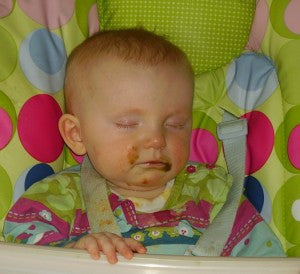I still get tearful when I think back to just how bad bedtime used to be. It would take literally hours to settle Miss T and then, just 40 minutes later, she would wake in a frenzy of scratching. This pattern would continue throughout the night and by morning both of us were totally exhausted.

Finally asleep!
Sleep is so central to basic survival. It’s when we recharge our batteries both physically and emotionally. It’s necessary for our immune system to function well and a time when our cells do a lot of their repairing. So it’s no wonder that when we are deprived of sleep, we can start to feel really unwell and unable to cope with our day-to-day activities.
When it comes to eczema, a tired child is also an itchy child, and a tired parent is a parent who finds it very hard to cope with an itchy child. It’s definitely a vicious circle!
Trying to use traditional sleep training methods usually won’t work. How can you leave a child to cry when she is scratching her skin until it bleeds? However there are some things that will help make bedtime a little easier.
Try not to introduce any new foods at teatime. Keep this for earlier in the day and then if your child has a reaction you will have more time to deal with it.
Make sure you keep all pets out of bedrooms as this can make children more itchy and worsen their eczema.
A bedtime routine is important for all children as it allows them to start to understand the transition from daytime activities to sleepy time. Often this will need to include time to lather creams on and we usually did this in front of the television as this meant we had less tantrums. Although tantrums are often unavoidable, we tried to circumnavigate them at bedtime as it just meant that Miss T would get hotter and more itchy the more she screamed!.
If you bath your child before bed, make sure that the water isn’t too warm and don’t use any products with fragrances. If possible, give creams at least half an hour to soak in before your child gets into bed.
Children (and adults) with eczema often find that they get hotter at night, and this in turn can make them even itchier. Keeping your little one’s room cool is really important. Turn off the radiator and instead add layers of clothing/blankets that can be adjusted to your child’s body temperature.

Bamboo Bubby sleeping bag
Ensure that all bedding and pyjamas are made from natural materials such as cotton or bamboo and wash these at 60C at least twice a week to kill off dustmites. Put dustmite covers on mattresses, pillows and duvets.
Covering your child’s hands with some scratch mittens or using our sleeping bags with mittens can also really help. Try to avoid putting socks on their hands as most are made from synthetic material and this will heat and irritate the skin.
Above all try and get some sleep yourself. Whether it’s a quick nap during the day, or going to bed much earlier than normal. The more sleep YOU get, the more able you will be able to deal calmly with your child.


Leave a comment